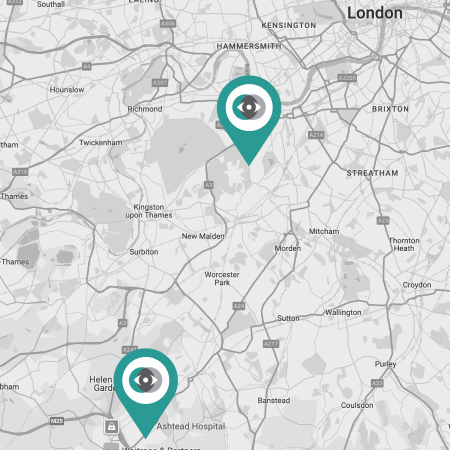
Can cataracts move around?
If you’ve been told you have cataracts, you might have wondered: Can cataracts move around in the eye? Some people notice their vision seems to change from day to day, or that blurriness shifts, and they wonder if the cataract itself is “moving.”
The short answer is no, cataracts don’t move. But your vision might feel like it’s changing because of how cataracts develop and how light enters your eye.
In this article, we’ll explain what cataracts really are, why your vision might seem to change, and what you can do about it. We’ll also share insights from Professor Paul Ursell, a leading cataract surgeon in London & Surrey who helps patients understand and treat cataracts every day.
What exactly is a cataract?
Inside your eye, there’s a clear lens that helps you focus light. This lens sits behind the coloured part of your eye (the iris) and focuses light onto the retina, the light-sensitive layer at the back of your eye.
A cataract happens when that clear lens becomes cloudy. This cloudiness scatters light, making your vision blurry, hazy, or dull. It can feel like looking through a foggy window.
Cataracts develop slowly over time and are very common as we age. Most people over 60 have at least some clouding, even if it doesn’t yet affect their vision much.
So, can cataracts move around?
No, cataracts don’t move inside your eye.
A cataract is not a separate object floating around. It’s part of your lens, and the lens itself is held in place by fine fibres called zonules. These tiny fibres anchor the lens firmly in one position behind your iris.
Because the lens doesn’t move freely, the cloudy part (the cataract) can’t move either. It stays exactly where it forms, within the lens capsule.
What can change, though, is how light passes through it, which can make your vision seem to shift from day to day.
Why does my vision seem to change if cataracts don’t move?
Even though the cataract itself is stable, several things can make your vision seem different over time.
Here are the most common reasons:
- Light and glare
Cataracts scatter light, especially bright sunlight or headlights at night. Depending on lighting conditions, your vision may appear clearer or hazier at different times of day. - Pupil size
Your pupil naturally gets larger in dim light and smaller in bright light. When it widens, light passes through more of your lens — including the cloudy parts. This can make your vision seem worse in the evening or indoors. - Lens changes
Cataracts can slowly grow or change density. Over months or years, the cloudiness increases, which can make your vision blurrier or colours appear more yellowed. - Eye dryness or fatigue
Sometimes, changes in tear film or eye strain can make your vision fluctuate, even if the cataract itself hasn’t changed at all.
These day-to-day changes are normal for people with cataracts, but again, the cataract itself stays fixed in place.
What does a cataract look or feel like?
You can’t see a cataract just by looking in the mirror, but an eye specialist can detect it easily during an eye exam.
Common signs of cataracts include:
- Cloudy or blurry vision
- Glare or halos around lights
- Faded or yellowed colours
- Needing brighter light for reading
- Trouble seeing at night
- Frequent changes in your glasses prescription
If you’re noticing any of these, it’s worth getting your eyes checked, take our suitability test to see whether cataract surgery might help you see clearly again.
What if my cataract “feels” like it’s moving?
Sometimes people describe sensations like “something in my eye” or “my vision jumping.” These feelings can be worrying, but they’re rarely caused by a cataract moving.
Possible reasons include:
- Dry eyes - can cause a gritty feeling or fluctuating vision.
- Floaters - small spots or strands that drift across your vision, caused by tiny clumps in the gel inside your eye (the vitreous).
- Eye strain or fatigue - can make vision feel unstable or uncomfortable.
If you notice sudden flashes of light, a curtain-like shadow, or lots of new floaters, contact your eye specialist right away. These could be signs of a retinal problem, which needs urgent attention.
Can cataracts get worse quickly?
Most cataracts develop slowly, often over years. But sometimes they can worsen faster, especially if caused by:
- Diabetes
- Eye injury
- Certain medications (like steroids)
- Past inflammation or surgery
If your vision changes quickly, it’s best to have your eyes checked soon. Early assessment helps ensure you get treatment at the right time, before your vision becomes too limited.
How are cataracts treated?
Cataracts can’t be treated with drops or medicine, the only way to restore clear vision is through cataract surgery.
During surgery, the cloudy lens is gently removed and replaced with a clear artificial lens, called an intraocular lens (IOL).
The procedure is quick, safe, and usually done under local anaesthetic. Most people notice a big improvement in vision within a few days.
With the help of an experienced surgeon like Professor Paul Ursell, cataract surgery can give you back sharp, bright vision, and it’s one of the most effective surgeries performed today.
What happens if I don’t treat my cataracts?
If left untreated, cataracts will continue to cloud your lens and reduce vision. Over time, this can make reading, driving, and recognising faces harder.
Cataracts don’t damage the rest of your eye, but they do make life less clear and more frustrating. When vision starts to interfere with daily life, that’s the time to consider surgery.
Early surgery often means easier recovery and better outcomes.
Final thoughts
Cataracts may change your vision, but they don’t move around. The cloudy lens stays fixed in place, it’s the way light passes through it that changes.
If your vision feels like it’s shifting, or if daily life is becoming harder because of cloudy sight, it may be time to think about treatment.
With expert care from Professor Paul Ursell in Surrey, cataract surgery can restore your vision safely and comfortably, and help you see the world clearly again.
Take the suitability self test today to find out if you’re ready to start your journey toward brighter vision.
Are you suitable for vision correction surgery?
It isn’t suitable for everyone.
The first step is to book an assessment so you can find out whether you can benefit.
Our most popular procedures
What our patients say…
★ ★ ★ ★ ★“Excellent result. Complete confidence in Paul Ursell. Quiet, quick, and efficient. Peaceful and comfortable hospital.”
★ ★ ★ ★ ★
“The cataract surgery on both of my eyes went very smoothly without any problems. There was no pain afterwards and I didn’t have to wear any eyepatch. I would highly recommend Professor Ursell for cataract surgery.”
★ ★ ★ ★ ★“Highly professional, extremely efficient, and an excellent communicator, Paul exudes experience, knowledge, and ability. The whole process — initial consultation, operation, and post-op check-up — was wonderfully stress-free. I now have 20/20 vision, am glasses-free, and I am delighted by the results.”
★ ★ ★ ★ ★
“The cataract surgery has completely changed my life. Mr. Ursell put me at ease and explained all options. The procedure was quick and painless and completely successful, and I now have 20/20 vision in my good eye. One of the reasons I had the surgery was because of Mr. Ursell’s standing and experience. Cannot praise highly enough.”
★ ★ ★ ★ ★
“I was very short-sighted and my cataracts badly affected both reading and distance acuity. After the operation I now have very good distance vision (glasses-free) but still need glasses for reading. (This was the expected outcome as I did not want multi-focus implants). The operation was quick and painless, and I had no post-operative discomfort at all (which surprised me). The results are remarkable.
I can certainly recommend Professor Ursell. He is a personable consultant and a skilled surgeon.”
★ ★ ★ ★ ★
“Dr. Paul Ursell squashed many of my concerns for not having cataract surgery. He offered comfort with examples of his long/distinguished career and new technology that he applies to the surgery.
Both before and after the surgery, Dr. Ursell and staff gave me the information and attention I needed. It was a great success, and I highly recommend Dr. Ursell.”
We have replaced the images of real patients who provided these testimonials to protect their privacy.








